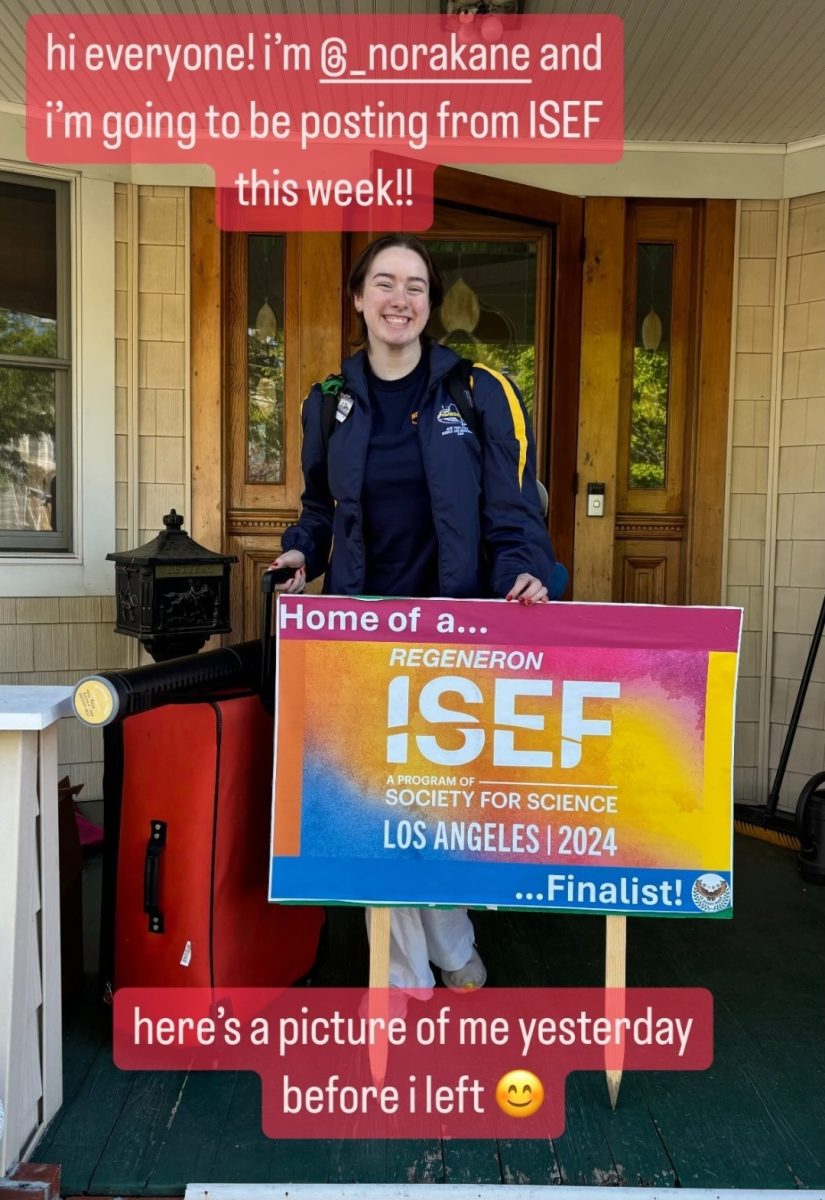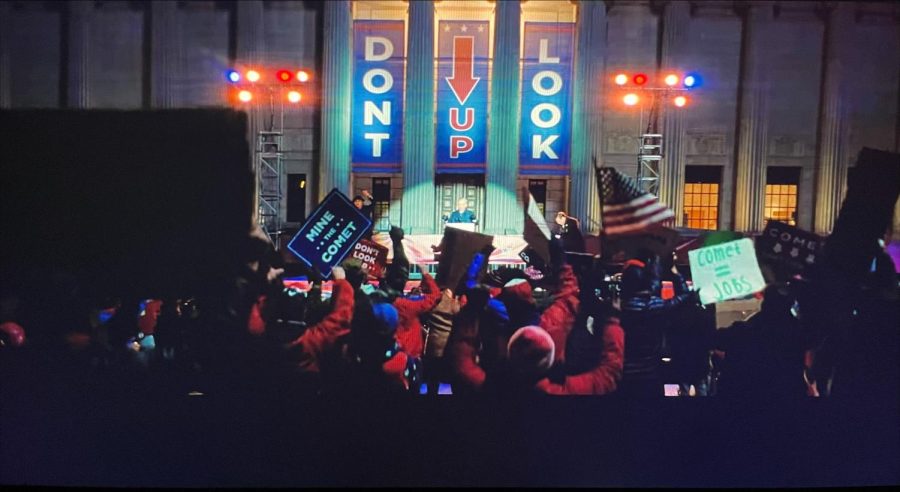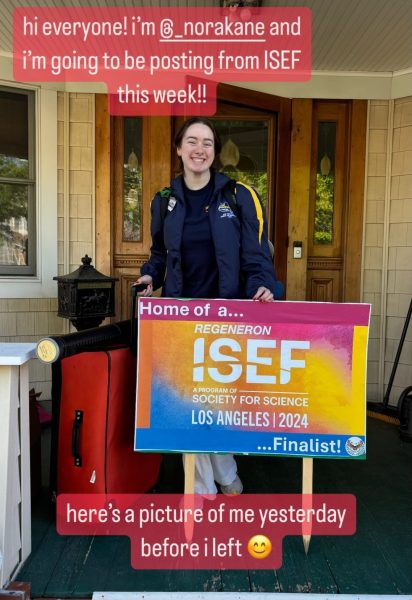Where to Look: A “Don’t Look Up” Review
After a year of political turmoil, discourse on COVID-19, masks, and vaccinations, it was refreshing to see a satirical film that additionally managed to make commentary on a larger issue at hand: climate change. Don’t Look Up, directed by Adam McKay, showed viewers how America is perceived from an outsider’s point of view, and, quite frankly, how embarrassing the country is. In this brilliant film, McKay commentated on issues that Americans should become more cognizant of, such as political corruption or the harmful effects of social media.
In the opening credits, viewers become prepared for a film with a stellar cast. Don’t Look Up opens with doctoral candidate Kate Dibiasky, played by Jennifer Lawrence, discovering a new comet. She shared her findings with her astronomy professor, Dr. Randall Mindy, portrayed by Leonardo DiCaprio. DiCaprio is known for his stance on climate change and other world issues; therefore, the accurate casting made Don’t Look Up that more enjoyable to watch.
In addition to the intelligent and educated students and professors in this film, there is also a corrupt politician. Meryl Streep took on the role of President Orlean, the female leader who had relations with the new Supreme Court judge, advertised her smoking habits, and promoted her son, Jason Orlean (Jonah Hill) to the position of Secretary of State. McKay paid attention to detail in making President Orlean seemed realistic. Her desk was adorned with framed photographs of herself and former United States President Bill Clinton. Additionally, when President Orlean held rallies urging her supporters and followers to not look up, many people in the crowd were spotted wearing bright red hats with her new slogan embroidered in white letters: “Don’t Look Up.” Many of her supporters paired these hats with American flag apparel. In real life, the flag of this country has managed to become a political symbol, rather than a flag meant to unite a nation. McKay carried this change into the film.
Music is a language, and apparently, gossip between music artists is also a language. The Daily Rip, the news network of choice, is hosted by Brie Evantee (Cate Blanchett) and Jack Bremmer (Tyler Perry). The first segment is an interview with Riley Bina (Ariana Grande) about her recent breakup with DJ Chello. Ironically, Grande is an artist who is known for her relationships, especially the songs she writes about them (did someone say “Thank U, Next?”). The major segment of the episode was intended to be Dibiasky and Mindy educating viewers about the comet that was expected to strike Earth within the next six months, but more of the focus was put on Bina’s breakup.
“It’s because of that phone.” “Screenagers.” Generation Z has some of the worst posture known to man because of the cell phones that many hold in their hands each day. Mark Rylance plays Peter Isherwell, the sinister tech giant who owns the company BASH Liif, whose motto is “Life, without the stress of living.” People speculate that Apple may be collecting more data than users agree to, but BASH Liif exceeds the limit. Isherwell even told Mindy at one point that the technology in BASH Liif phones can predict with high accuracy how the user will die. A BASH Liif phone can track the user’s mood, and it can show curated content to improve one’s mood, and even schedule therapy appointments. Social media also played a large role in Don’t Look Up. Accurate information about the comet was buried beneath memes of Dibiasky after her blunder during her appearance on The Daily Rip when she aggressively said to the camera that all the viewers were going to die.
After watching the film multiple times, McKay is clearly commentating on the climate change response in this country, more so the lack thereof. Climate change is a problem that is affecting everyone, whether one would like to admit it or not. Of course, there are ways for civilians to help, such as using modes of transportation other than cars (mass transportation, biking, walking), reducing animal products in one’s diet, or even becoming zero waste, but there is only so much that every-day citizens can do. “It’s kind of up to us as the next generation to make an effort to slow the effects of climate change,” said freshman Chloe Brown.
While social media certainly has many negative effects, as seen in the film, it did enable people who knew that the comet was a problem to post about it and make sure others pay attention to it. The same can be said for climate change. “Social media has been able to spread awareness about climate change and educate people because it’s so important,” shared sophomore Leigh Caponi. Through infographics, posts about climate strikes, or even links that can calculate for users what their carbon footprint is, social media makes resources for slowing down climate change more accessible. “People are posting about [climate change] to bring awareness and hopefully gain recognition from our world leaders, and depending on what those leaders’ priorities are, they will either turn a blind eye or actually try to make an effort to put care into our planet,” said Brown.
Towards the middle of Don’t Look Up, there is an opportunity for the comet to be deflected, but Isherwell tells President Orlean to stop the mission, as he discovers that the comet contains precious minerals that could be used to produce more cell phones. Isherwell is a rich guy who says he can solve the comet problem, but instead, he decides to be selfish. CEOs of major corporations like Amazon and Facebook are doing the exact same thing. People with billions of dollars in their bank accounts, like Jeff Bezos or Mark Zuckerberg, could literally solve climate change if they wanted to, but they are doing very little to save the world.
Even after its release on December 24, this Netflix original film is continuing to be watched and discussed by viewers who care. Overall, it does not matter in what direction one looks; just look at a screen, and watch Don’t Look Up.

Hey there! My name’s Gianna, and I’m a member of the Class of 2025, along with many clubs here at LHS. In my spare time, you can find me on the stage,...
















![Key Club members pose for a photo with Club Advisor Dr. Tieniber [far right] at Stonebridge Country Club. Photo Courtesy of @lhstieiber Instagram page.](https://lhshorizon.com/wp-content/uploads/2024/10/tempFileForShare_20241014-162748.jpg)





















![Key Club members pose for a photo with Club Advisor Dr. Tieniber [far right] at Stonebridge Country Club. Photo Courtesy of @lhstieiber Instagram page.](https://lhshorizon.com/wp-content/uploads/2024/10/tempFileForShare_20241014-162748-600x448.jpg)
